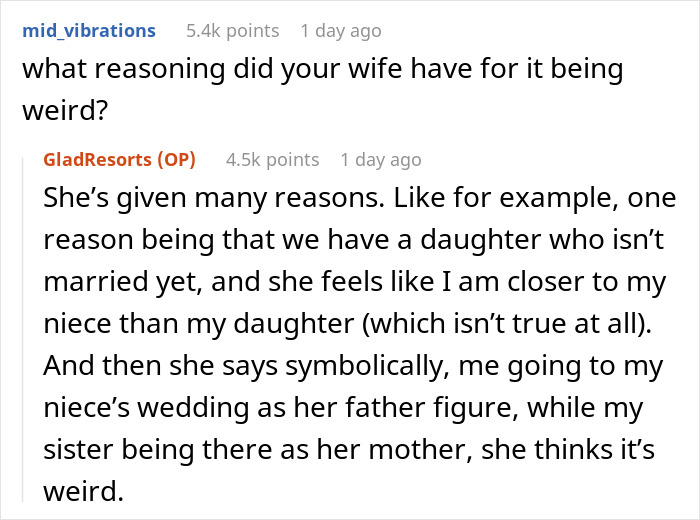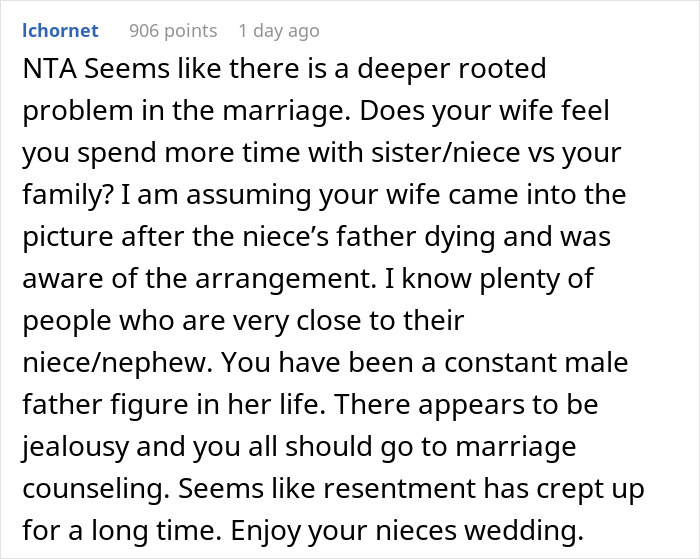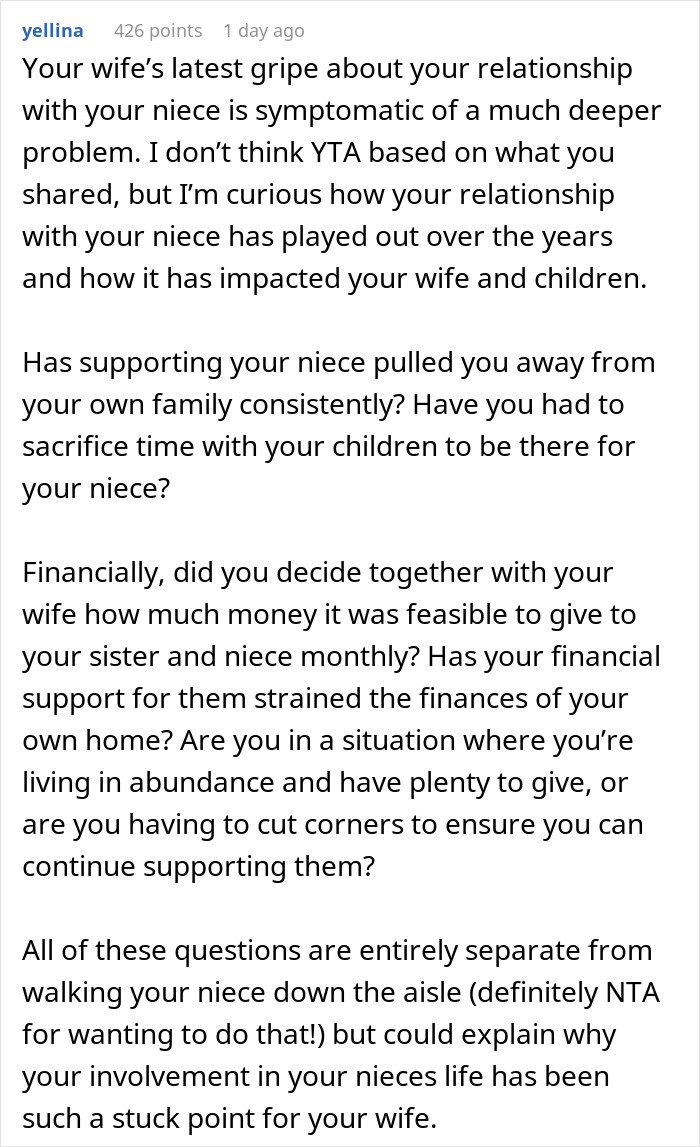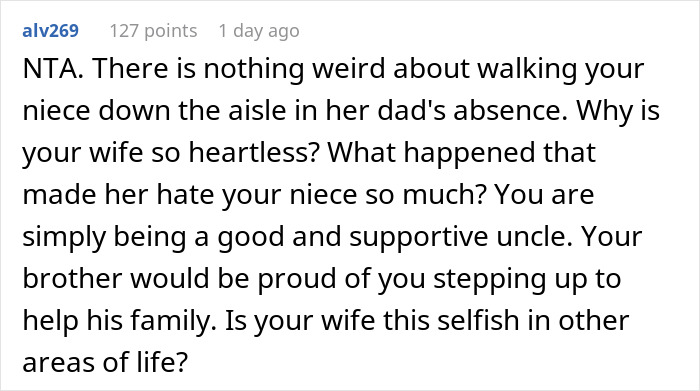Losing a parent can very negatively affect a child’s life. After all, they lose a person who was meant to raise them. Luckily, some children have other people in their lives who can help them to grow up.
Today’s story focuses on a woman who lost her dad when she was little. Fortunately, her uncle stepped into father figure shoes. And so, it’s no surprise that she asked him to “give her away” during her wedding. But this caused some tension in his marriage.
More info: Reddit
Should an uncle give away his niece during her wedding if she asks him to?

Image credits: Pavel Danilyuk (not the actual photo)
The author’s niece lost her father when she was little, and ever since then, he was basically her father figure, even though his wife wasn’t a fan of it
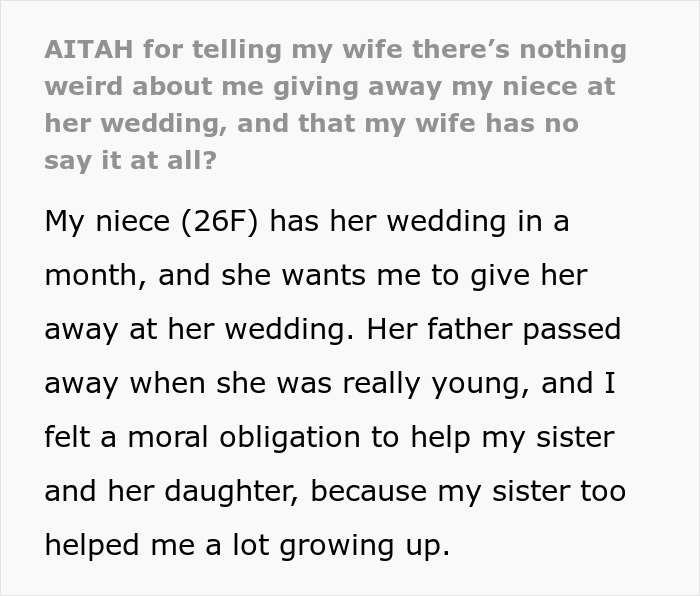


Image credits: Fernanda De Freitas (not the actual photo)


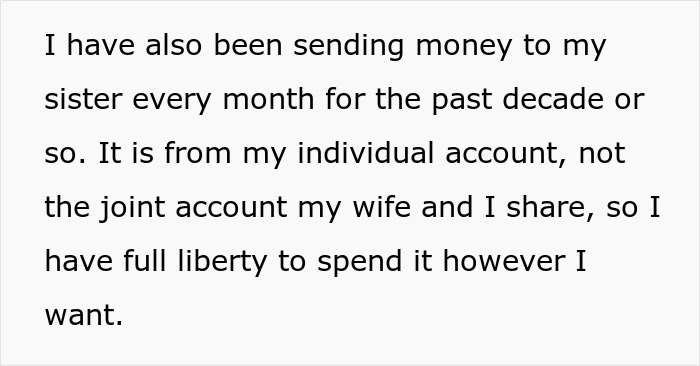


Image credits: Keira Burton (not the actual photo)

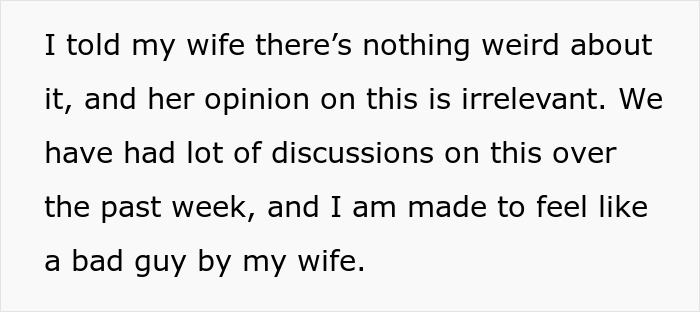

Image credits: u/GladResorts
When the girl grew up, she asked him to “give her away” during her wedding, but his wife said it was a bizarre request and he shouldn’t do it
The original poster has a niece who lost her father when she was really young. Early parental loss might result in a kid struggling with anxiety, depression, eating disorders, self-esteem, and many other mental health disorders, including prolonged grief. It can become so bad that it interferes with a person’s daily life and causes problems with other relationships.
To talk about the complications that come with losing a loved one, Bored Panda reached out to certified EMDR Therapist Khalida Himes. Check out her Instagram, TikTok, and YouTube channel.
She reiterated our idea that the death of a loved one, like a parent, can disrupt a person’s life and mental health. But she also mentioned that the way a loved one passes can significantly influence the way a person grieves. For instance, if someone is dying from a terminal illness, people around them can prepare for their loss, no matter how dreadful that sounds. Yet, when a death is unexpected, coping with it can be way more challenging.
Bringing all of this back to today’s story, at least as much as the OP wrote about, he didn’t mention how the niece’s dad died, nor did he mention her struggling with anything like prolonged grief. Maybe it’s because he always helped her mom raise her. After all, having reliable people in one’s life can surely help a person deal with grief. Just as our interviewee said, it’s important to “have your pain witnessed — we need someone to acknowledge our loss [and] pain and just witness where we are and ‘sit with us in the darkness.'”
The OP and his family lived about 10 minutes from his sister’s home, so he tried to be as physically present as possible in his niece’s life during her childhood. Yet, not everyone in the man’s life was very happy with this arrangement. For example, his wife.
Over the years, the couple had quite a few arguments due to this. While he didn’t clarify in the post, we can only guess that the woman felt that him taking care of his niece made him neglect his own children.
But he was not only physically taking care of his niece — he was also sending his sister money for around a decade. Granted, it always came from his personal account, so he had full liberty to spend it how he wanted. And he chose to help his sister raise her daughter. Quite a noble investment, isn’t it? Yet, the wife wasn’t pleased with this either.
Now that the OP’s niece is a 26-year-old woman, she is getting married. And so, she asked her uncle to give her away during the wedding. This custom comes from thousands of years ago.
Basically, women used to be viewed as the property of their fathers. It was his duty to find her a good husband and transfer her ownership to him. Sounds terrifying, doesn’t it? Well, luckily, nowadays, the tradition usually isn’t taken literally.

Image credits: Abi Greer (not the actual photo)
Now, a bride chooses whether she wants to be accompanied by someone on her way to the altar. If she wants this, it can be either one of both of her parents or any other person she feels comfortable with. Essentially, this way, she gives a person she loves a part in the ceremony.
For the bride in today’s story, this person was her uncle who helped raise her. Ultimately, he likely is the main father figure in her life. Yet, it doesn’t mean that she completely forgot about her late father. Khalida mentioned that when people move on with their lives, it doesn’t mean they don’t miss the late loved one: “Moving on does not mean that we forget about our loved ones. It simply means that we eventually learn how to reinvest in life without them, and the grief becomes less frequent over time.”
So, it is beautiful that the woman in the story has a father figure in her uncle. Yet, her asking him to “give her away” didn’t make his wife happy. She thinks it was weird for the niece to even ask this.
Apparently, she was the only one who thought that it was weird. When her husband posted about this situation on Reddit, people there were confused as to why she thought this way. They pointed out that she should be proud of her husband for taking care of a child who was left fatherless.
Yet, there were some who questioned why the wife was so frustrated with this arrangement when it sounded great from the outside perspective. To one commenter, he answered that his wife had given him her reasoning. She feels that he’s closer to his niece than his daughter, but he claims that it’s not true.
Well, we don’t want to assume the worst about some strangers, so we really hope that this theory isn’t true because it would paint the whole story in a very different light, wouldn’t it?
It also just simply seems weird to her that he would go to the wedding as a father figure while the mother figure there is his sister.
Anyway, in the end, the couple needs to find a way for this whole situation to feel good to both of them. Yes, being a father figure to someone who lacks it is good, but it shouldn’t ruin your life (or marriage) either.
He told her he’s gonna do it no matter what she said, and when he posted about it online, people there were left wondering why the wife was so weirded out by this whole situation
